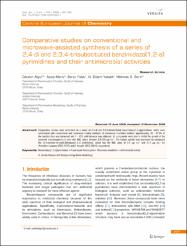Comparative studies on conventional and microwave-assisted synthesis of a series of 2,4-di and 2,3,4-trisubstituted benzimidazol[1,2-a] pyrimidines and their antimicrobial activities
Abstract
Comparative studies were performed on a series of 2,41-di and 2,3,4-trisubstituted benzimidazo[1,2-a]pyrimidines, which were synthesized with conventional and microwave heating methods. In microwave irradiation method, approximately, 95 - 97.5% of the reaction time was increased and 1 - 45% yield increase was obtained. All compounds were able to inhibit the growth of the screened microorganisms in vitro with MIC values between 3.9-250 mu g mL(-1). The highest activity was expressed by compound IIId (2,4-diphenyl-benzo[4,5]imidazo[1,2-a] pyrimidine), which has the MIC value of 3.9 mu g mL(-1) and 31.2 mu g mL(-1) for Penicillium natatum ATCC 24791 and E. faecalis ATCC 29212, respectively.
Source
Central European Journal of ChemistryVolume
7Issue
3Collections
- Makale Koleksiyonu [317]
- Scopus İndeksli Yayınlar Koleksiyonu [8325]
- WoS İndeksli Yayınlar Koleksiyonu [7605]


















